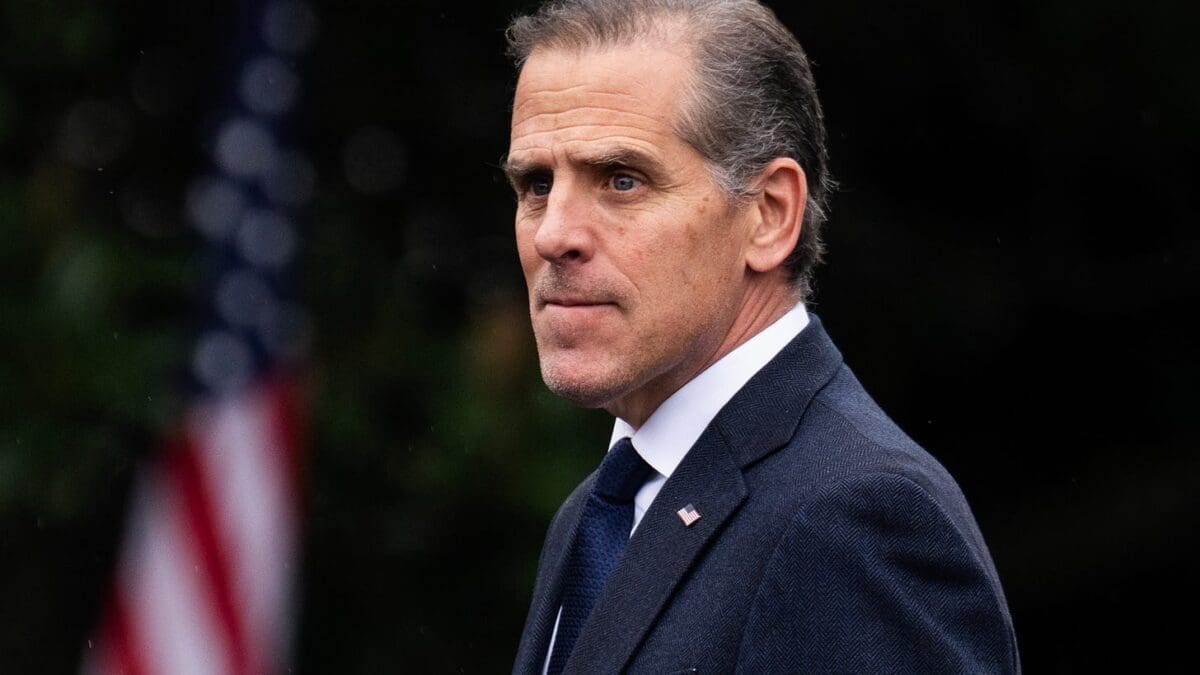
Tim Miller Goes Off on Dave Rubin
March 26, 2025
Trump ‘Cards’: Foreign Policy Without Principle
March 27, 2025ALONG WITH FIFTY OTHER FORMER senior intelligence officials, I signed a letter in October 2020 warning that Rudy Giuliani’s disclosure of a laptop allegedly belonging to Hunter Biden—just three weeks before the election—posed a potential risk of Russian interference in our electoral process. The laptop contained sexually explicit content, raising concerns about its timing and origins.
When Trump lost the election, he and his supporters constructed a strawman argument by distorting our words and falsely attributing deceptive intentions to our letter. Ever since, Trump has repeatedly attacked the authors of the letter, including former CIA Directors Michael Hayden, Leon Panetta, and John Brennan. He has raised the issue on multiple occasions, and most recently, during a March 14 speech at the Justice Department, where he accused the 51 signers of lying and breaking the law “on a colossal scale.” He even mentioned it during his meeting with Ukrainian President Zelensky in the Oval Office.
On his first day in office, Trump signed an executive order revoking the security clearances of the letter’s signatories—a largely symbolic move, as we were all retirees, with only a few maintaining clearances for contract work. Right-wing publications ran headlines decrying “spies who lied” and lambasting the “Dirty 51.”
Trump’s allies have escalated these attacks further. Elon Musk warned that “The hammer of justice is coming” for those who promoted such “foreign interference hoaxes.” Mike Davis, once rumored to be a candidate for attorney general, went even further, stating, “I want to drag their dead bodies through the streets, burn them, and throw them off the wall.”
Trump’s self-proclaimed “Secretary of Retribution” Ivan Raiklin placed our names on his “deep-state target list.” He elaborated: “Let me expose them by name, date, place, transgression, category. And let’s start educating the country on who they are, so that they’re not able to walk anywhere, whether it’s in the digital space or physical space, without them feeling the, let’s just say, wrath of their neighbors, friends, relatives, family.”
Even Trump’s National Security Advisor Mike Waltz falsely claimed we had used our security clearances and access to spread false information.
Walz and others exploit the public’s lack of understanding of the national security process to spread a false narrative. They must be fully aware that their allegations are untrue. They know all the signatories were retired, none used classified information, and none coordinated with the CIA. They also know that there is no “deep state” working against the president.
Furthermore, they undoubtedly recognize that retired federal workers have First Amendment rights. In fact, Waltz himself authored a book criticizing various administrations after completing his military service. At the same time, roughly 270 military officers issued an open letter within days of the Hunter Biden story, endorsing Trump’s candidacy and warning that Biden’s election would bring Marxists and Communists into the government. By contrast, our letter neither mentioned candidates nor any political party; it focused solely on Russian interference.
Nonetheless, the Republican reflex was apparently to assume that our letter was a partisan political stunt. They never seemed to consider that we might have meant what we said. We were careful. We explicitly stated that we had no access to classified information. What we did have was deep experience with Russian perfidy, and we intended the letter as a warning. It was about Russian interference, not Democrats or Republicans. I had been retired for almost seven years and no longer had a security clearance—but I did have decades of experience dealing with Russian malign disinformation campaigns, and that is what the letter addressed.
But that’s not what people think it addressed.
THE FIRST MAJOR STORY ABOUT THE LETTER ran under the headline: “Hunter Biden story is Russian disinfo, dozens of former intel officials say.” We never said the story was false—only that its appearance may have been the work of the Russian government and that it gave Russia an opportunity to manipulate American voters. It didn’t help when, during a presidential debate, Joe Biden misrepresented the letter’s contents, claiming we said that the Hunter Biden laptop story was “a Russian plant” and “a bunch of garbage.”
Adam Schiff, then a member of the House, now a Senator, said before our letter was published that “we know that this whole smear on Joe Biden comes from the Kremlin. . . . Clearly, the origins of this whole smear are from the Kremlin, and the president [Trump] is only too happy to have Kremlin help and try to amplify it.” Those conclusions were hasty and overstated; we did not express such certainty in the letter.
There is still no firm evidence that I am aware of that the laptop itself was part of a Russian deception scheme. But Schiff’s and Biden’s message soon became fused with ours. Trump supporters encouraged the misunderstanding of our message. Rather than reading the letter and engaging with its content, they created a straw man. What was intended as a serious warning—that Russia could exploit the incident for malign purposes, similar to their hacking and release of Democratic National Committee emails before the 2016 election—was quickly swallowed by a narrative that the signatories had crafted the letter to aid the Biden campaign by distracting from the lewd material found on the laptop.
Many people who never read our letter believe that we claimed that the laptop’s content itself was created by Russian intelligence. This became a convenient talking point to discredit the letter by falsely asserting that we had declared the laptop itself a fabrication. In reality, our letter aimed to highlight the broader risks of Russian disinformation. Specifically, we wrote:
Each of us believes deeply that American citizens should determine the outcome of elections, not foreign governments. All of us agree with the founding fathers’ concern about the damage that foreign interference in our politics can do to our democracy. . . . It is for all these reasons that we write to say that the arrival on the US political scene of emails purportedly belonging to Vice President Biden’s son Hunter . . . has all the classic earmarks of a Russian information operation. . . . We want to emphasize that we do not know if the emails, provided to the New York Post by President Trump’s personal attorney Rudy Giuliani, are genuine or not and that we do not have evidence of Russian involvement—just that our experience makes us deeply suspicious that the Russian government played a significant role in this case.
The bizarre circumstances surrounding the story’s release heightened our concerns. According to reports, a computer store employee in Delaware gave a laptop—allegedly abandoned by Hunter Biden—to Rudy Giuliani. At the time, Giuliani was frequently traveling to Ukraine to dig up dirt on the Biden family. The FBI knew that Giuliani was interacting with known Russian intelligence officers in Ukraine. After the New York Post published the story, the FBI alerted Twitter—which was hesitant to promote a potentially misleading narrative—that Russian intelligence was attempting to manipulate Giuliani.
Giuliani held onto the laptop hard drives until just weeks before the 2020 election, at which point he shared the material with the New York Post. Giuliani and the Post seemingly hoped the contents would provide evidence of criminal activity by Hunter Biden and his father, thereby aiding the Trump campaign. The unusual circumstances of the story, along with the murky chain of custody—former congressman and Air Force officer Denver Riggleman, as a member of Hunter Biden’s legal team, reviewed the entirety of the data and found it forensically unsound, most likely containing a mix of information from multiple drives and devices—only heightened our concerns.
Although all the material on the laptop hard drives is now available, no charges have been filed. Highly motivated individuals have had access to it for years, and yet have not uncovered anything incriminating. That said, what little has emerged regarding Hunter Biden’s actions abroad and some of the material on the laptop suggest unethical and despicable behavior.
Our sole concern, however, was Russian interference.
The incomplete and sensationalized nature of the story about Biden’s laptop, coupled with its release during a highly charged political campaign, underscored the need for careful contextualization. Drawing on decades of experience with Russian interference, the signatories of the letter issued a warning to critically assess a potential October surprise that bore a strong resemblance to Russia’s meddling four years earlier. The Republican-led Senate Intelligence Committee’s report found clear evidence of Russian efforts to influence the 2016 election and cautioned that the United States remained vulnerable in 2020. Moreover, U.S. intelligence agencies had warned in February and August 2020 that Russia was once again interfering in the election by spreading false information about candidate Joe Biden.
When we wrote the letter in mid-October 2020, there were already public indications that Russia might be using Trump allies to spread deceptive information. In the lead-up to the election, National Security Advisor John Bolton instructed his staff to avoid the president’s lawyer Rudy Giuliani after the FBI warned that he was spreading conspiracy theories aligned with Russian interests—interests aimed at disrupting the upcoming election.
While Giuliani was in Ukraine hunting for anything he could use to smear Joe Biden, he received bogus information from then-Ukrainian lawmaker and Russian agent Andrii Derkach. The Treasury Department reported that Derkach “waged a covert influence campaign centered on cultivating false and unsubstantiated narratives concerning US officials in the upcoming 2020 Presidential Election,” which included edited audio tapes and other materials intended to discredit Biden. The Department of Justice later indicted Derkach for evading sanctions as part of his efforts “to influence the 2020 U.S. Presidential election on behalf of the Russian Intelligence Services.”
According to an article published shortly after our letter, Giuliani’s associate, Lev Parnas, stated that he and Giuliani were informed about the sexually explicit contents of Hunter Biden’s laptop while in Ukraine in May 2019—before the Delaware computer repairman claimed to have shared it. He added that he was told Hunter Biden had lost the laptop during a trip to Ukraine in 2014, and that the material had subsequently fallen into the hands of Russian intelligence services.
Furthermore, the primary source that Giuliani and others relied on for their claims that the Biden’s were engaged in criminal activity was FBI source Alexander Smirnov. Only after the 2020 election was Smirnov arrested and found guilty of lying to the FBI. He had been secretly meeting with a high-ranking member of Russian intelligence and accused of fabricating a tale of bribery involving Biden.
Given Moscow’s history of covert attacks and the Trump team’s frantic efforts to unearth damaging information in Russia’s backyard, was it unreasonable to suspect Russia might exploit Giuliani’s desperation? To the contrary: If Russian intelligence ignored such an opportunity, it would have been professional negligence.
While we couldn’t be certain at the time, a later 2021 report from the Director of National Intelligence confirmed that Russia’s efforts were aimed at “denigrating President Biden’s candidacy and the Democratic Party, supporting former President Trump, undermining public confidence in the electoral process, and exacerbating sociopolitical divisions in the US.” The report further stated that Russian intelligence agencies sought “to launder influence narratives” by using media organizations, U.S. officials, and people close to Trump, in order to push “misleading or unsubstantiated allegations” against Biden.
OF COURSE, THE TRUMP SUPPORTERS attacking the letter do not appear concerned about Russian sabotage or foreign interference in our elections—at least not when it seems to benefit them. Instead, many of them appear disappointed, even angry, that the major social media companies temporarily limited the speed at which the story could spread, and that the allegations in the story didn’t appear to have a major impact on the election. In other words, they’re upset that the obvious political ploy didn’t work. And now Trump is taking revenge on the people he deems responsible.
In this sense, Trump is weaponizing the legal system to target those who oppose him—a dictatorial tactic he frequently accuses his opponents of using.
Trump and other MAGA leaders falsely portray the signers of the letter as deep-state operatives rather than public servants. It’s even an open question whether Trump can fathom the idea of people offering honest, nonpartisan opinions. To him, everything is partisan. Any dissent is betrayal.
I signed the letter due to my concerns about Russian interference and the potential for another October surprise. Having written and delivered hundreds of articles, talks, and interviews on Russian political warfare and malign influence, I was keenly aware of how the Kremlin exploits and amplifies narratives that fuel division among Americans, using both true and false information to sow chaos.
For example, as far as we know, the hacked DNC emails in 2016 were authentic. While the material itself was real, its release was intended to cause harm. Similarly, Moscow covertly promoted extremist content to heighten tensions around controversial partisan and cultural issues in the United States, such as NFL players kneeling during the national anthem, as well as debates over vaccinations and school shootings. Given this context, the likelihood that Russian intelligence would leverage the Trump campaign’s pursuit of damaging material on the Biden family was close to 100 percent.
We did not expect an American administration to adopt the same tactics used by Moscow. When the highest officials in the country publicly smear anyone who disagrees with them, and the president threatens revenge and judicial action, our country edges closer to resembling Putin’s Russia. While America still has a First Amendment, it increasingly seems to apply only to those who agree with the president.
Great Job John Sipher & the Team @ The Bulwark Source link for sharing this story.





